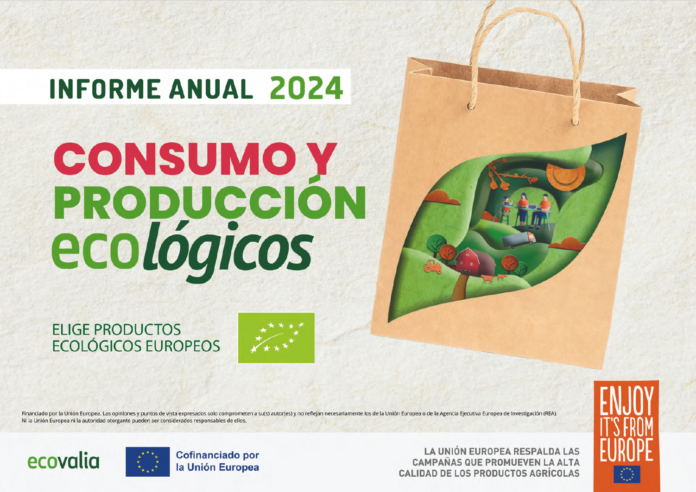The organic market continues to grow in Spain, reaching a value of 3 billion euros. This is reflected in the ‘2024 Annual Report on Organic Consumption and Production‘ by Ecovalia, presented last week in Barcelona.
The latest statistical data from the sector shows that the national organic sector continues on an upward trend. With a growth of 6.2% compared to the previous year (2023 data), the national organic market reaches a volume of 627,567 kg/L and consolidates its position in the top 10 European countries with the highest market share.
The average per capita expenditure on organic products stands at 64€. By Autonomous Communities, the Balearic Islands stand out with an average of 117€ per person, followed by Galicia (86€), the Basque Country (85€), Cantabria (83€), and Catalonia (80€). Catalonia and Andalusia lead the market distribution, with 631 million and 506 million euros respectively.
Consumer Preferences
The analysis of the shopping basket shows that vegetable organic foods are the most sought after by Spanish consumers (69%), compared to animal origin products (28%). The average price of vegetable origin products is 2.60 euros, while that of animal origin products reaches 7.82 euros.
An interesting fact is that the price of conventional foods has grown 23% above organic products, indicating that organic foods are more stable against inflation.
In terms of sales channels, Spaniards prefer large distribution to buy organic products (50%), followed by specialized stores (34%) and other channels (16%).
The European Union organic label, the Euro Leaf, is the most recognized label by consumers (64%). Among the main reasons for consumption, 43% highlight that organic foods are more natural, pesticide-free, and healthy. 20% choose organic products for their taste, quality, and origin.
Regarding consumption frequency, 43% of Spanish consumers consume organic products every week.
Organic production grows by over 60% in the last ten years
As for organic surface data, 2,675,331 hectares are already cultivated under organic agriculture systems in Spain (official data from 2022). Andalusia (50%), Castilla-La Mancha (16%), and Catalonia (9%) maintain their leadership positions at the national level.
Also noteworthy is the average growth of organic surface in the Basque Country (20%), Castilla y León (18%), and Aragon (17%) in the last five years. Overall, the Utilized Agricultural Area (UAA) reaches 11%.
Nuts continue to be the main organic crop (290,086 hectares), followed by olive groves (262,379 ha), cereals (242,721 ha), and vineyards (149,934 ha). Thus, 29% of nuts, 16% of vineyards, and 10% of olive groves are organically cultivated in Spain.
With 65,424 registered organic activities, business activity is also on the rise. The national organic sector already has 10,959 organic companies, representing a 23% growth in the last 5 years. Most are dedicated to plant production (85%), compared to 15% in animal production.
“The promotion of consumption is the key to continue developing organic production in Spain. We must work to increase the per capita consumption of Spaniards and to ensure that consumers recognize the organic label as the paradigm of food sustainability, backed by an official system,” concludes the president of Ecovalia, Álvaro Barrera, at the report presentation event.
The post El mercado ecológico español, valorado en 3.000 millones de euros appeared first on Organic Food Iberia.











